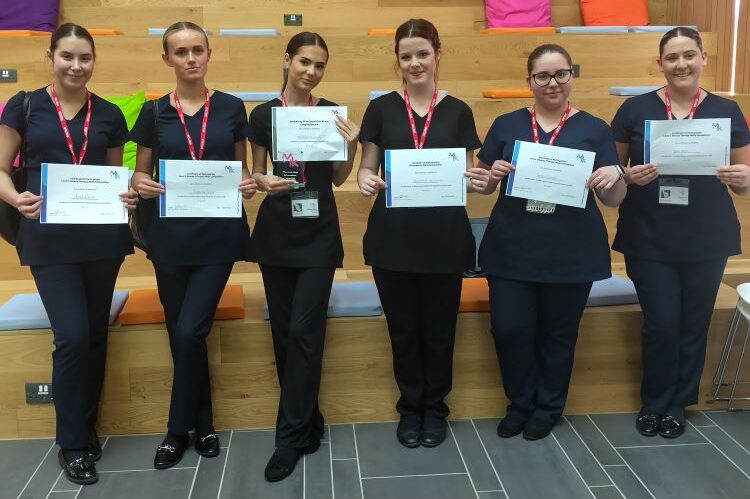Employer-responsive curriculum design – the sport and physical activity approach

The shift towards employer-responsive curriculum design, while in no way new, is not just a strategic priority but a necessity. With the government’s intensified focus on skills development, particularly through initiatives such as Skills England and the Lifelong Loan Entitlement (LLE), the alignment between FE colleges and industry needs is now firmly embedded in national policy.
The policy landscape continues to be clear that education must be agile, responsive, and reflective of employer requirements. FE colleges are expected to play a pivotal role in addressing local, regional and national skills shortages, but as we all know, this doesn’t come without challenges.
In the sport and physical activity sector, it’s no different.
The continued shift in the relationship between colleges and employers into structured partnership is one that we have embraced. Through the development of Local Skills Accountability Boards (LSABs), and the creation of Local Skills Improvement Plans (LSIPs), ours, like many other sectors, has been accelerating the collaboration between colleges and employers that respond directly to local priorities.
Our sector plays a crucial role across the whole economy. Skilled sport and physical activity professionals are essential for ensuring a healthy, active population who are able to undertake roles in other sectors. This is why when our sector set out to create 15 LSABs to support local health and economic priorities through greater curriculum and skills development alignment, we quickly saw demand that has turned into 37 LSABs across areas of England, Wales and Scotland.
For FE colleges that are working with the sector LSABs, this means greater engagement with local businesses, small and large, but also with health commissioners, local authorities and employment support providers.The aim is that through this collaboration courses can evolve in real time, guided by sector input and intelligence, helping to ensure that learners complete their course with skills that are immediately transferable to the workplace.
Loughborough College and Vision West Nottinghamshire College have been pioneers for this approach.
In Nottingham and Nottinghamshire, many employers, from large national leisure sites to sole traders and coaching and healthcare companies, have been engaged to assess their training and skills gaps within their current workforce and what they understand they need from a future workforce, by using a comprehensive skills diagnostic process. The LSAB then leveraged this data to work with local education provision and future education, with a leading role taken by Vision West Nottinghamshire College, to review local sport and physical activity education provision to align this with local employer needs. This evidence-based and employer-led approach led directly to the creation of four practitioner professional qualifications in 2021, endorsed by CIMSPA, the sector’s professional body, and now delivered by Vision West Nottinghamshire College. The study programmes feature a modular approach where learners graduate with qualifications enabling them to be deployed straight into the local workforce. These have evolved since launch so they continue to reflect what local employers need. By acting as a conduit between employers and education provision, the LSAB has linked the two more closely in ensuring high quality work placements and training opportunities for the students who will become the future workforce and enable them to become ‘work ready’.
This was highlighted in their most recent Ofsted report:
“The sport curriculum includes additional qualifications on physical activity and mental health, and swim teaching, to meet forecast industry demand.”
The Vision West Nottinghamshire College example sits at the heart of the area’s sector local skills plan. for sport and physical activity.
Nikki Slack, Assistant Principal of Health, Education and Service Industries at West Nottinghamshire College, said:
“The local skills plan will help to bring together employability-focused organisations who are committed to enhancing and developing skills within the sports and physical activity sector.
“It’s crucial to focus on the specific needs and skills gaps of both health and leisure organisations, as well as those aspiring to go into rewarding careers in this sector.
“Together, these partner organisations can build an intelligent picture of what is needed to boost qualifications and employability skills in this growing industry, as well as helping our communities to understand more about healthier lifestyles and the job opportunities available.
“At West Nottinghamshire College, we have already seen great results from bolstering our coaching and fitness practitioner professional qualifications. The professional standards attached to CIMSPA brings great kudos to the programmes and our students have benefited from enrichment activities within the workplace, which has often led to meaningful placements and employment opportunities.
“We’re looking forward to being able to expand our course provision, which originally started at Level 2, progressing to Level 3. There is much scope to look at accrediting a Level 4 management pathway, to enable more individuals to progress their skills and careers in this exciting area of work.”
Loughborough College has played an integral role in the creation of the Leicester, Leicestershire and Rutland LSAB. For Leicester, Leicestershire and Rutland, sport and physical activity is recognised as a priority sector, as referenced in the East Midlands Chambers’ 2023 Local Skills Improvement Plan. Sport and physical activity provides an estimated £1.4 billion in social value to Leicester and Leicestershire annually, due to the impact that the sector has on health and wellbeing, community cohesion, educational attainment and crime reduction.
The plan that the LSAB has created includes three recommendations:
- To recruit, train, support and retain a representative and inclusive workforce
- To support education establishments working with local employers
- To adopt a data-led approach to sector workforce development
To support this and through collaboration as part of the LSAB, Loughborough College has redesigned its provision, creating revised courses including the Coaching, Fitness and Physical Wellbeing Employability Programme. This programme has been specifically created to meet employer requirements.
Across both colleges, over 100 students have completed these employer responsive qualifications which has seen over £500,000 realigned into learning that meets local employer needs.
And the proof is very much in the results. The majority of students that have completed the qualifications have moved directly into employment with 70% securing roles with local employers in the sector.
The success of this approach has generated interest from colleges nationwide who are keen to develop their own version of the programme, aligned to local needs based on local data and insight.
Activate Learning launched a new programme using this approach at the start of this academic year at City of Oxford College and University Centre and Banbury and Bicester College. It is part of a partnership with key local employer GLL, a leading social enterprise managing leisure facilities across the UK.
Andrew Slater, Group Director for Lifestyles Faculty and Banbury and Bicester College and City of Oxford College and University Centre – Technology Campus, said:
“Activate Learning is passionate about creating opportunities for career success. This partnership aligns perfectly with our mission, providing students with the qualifications and real-world experience they need to flourish in the exciting world of leisure.”
Gary Starkey, GLL Head of Service for Oxfordshire, said: “
We’re delighted to be partnering with CIMSPA and Activate Learning on this innovative programme that will provide a direct pathway for students to join our organisation.
“As a charitable social enterprise, we are committed to supporting the local communities in which we operate and that includes through job creation and career development.”
As more colleges, through their involvement in sport and physical activity sector LSABs, align their curriculum to employer and local priority needs, there is the potential to realign almost £5million of education investment to meet employer needs over the next 18 months.
We are also considering as a sector what this means for adult skills. The Lifelong Loan Entitlement (LLE) offers the structure for a more flexible approach to education. As a sector we’re looking to colleges and other education providers to adapt their delivery models to accommodate modular, bite-sized learning that allows individuals who may be working full-time to upskill or reskill throughout their careers. This aligns perfectly with the shift towards lifelong learning, where short, employer-responsive courses can be delivered in partnership with industry to meet immediate skills needs. As a sector we’re piloting this with Cardiff Metropolitan University through micro-credentials but colleges involved in LSABs are also taking a keen interest.
As a sector we know that there is more work to do around flexibility in learning. Modular learning demands an agile framework, allowing learners to build qualifications incrementally. It also opens the door for adults in the workforce to engage in education without the traditional barriers of long, rigid programmes. By working in collaboration with employers, FE colleges can co-create more dynamic, employer-focused short courses that can be rapidly updated to reflect shifts in sector priorities.
Despite the clear benefits of an employer-responsive curriculum, there are significant operational challenges for colleges. Maintaining close links with a range of employers, each with their own needs, requires effort and resource. A rapid pace of change across many industries can make it tricky for colleges to keep their programmes current. However, work that is taking place in sectors like ours to facilitate ongoing collaboration based on local priorities, has to be the way forward. That collaboration, facilitated by sector professional bodies, provides an opportunity for all those with an interest in skills development to address challenges through innovation.
The expectation for regular curriculum reviews, informed by LMI and input from employers and other key stakeholders, necessitates a change from static curriculum development cycles that no longer fit the policy environment. Being part of an LSAB helps to lighten the load on colleges as much of the intelligence and insight they need for such reviews, particularly for the sport and physical activity sector, will be available within the LSAB partnership.
Employer-responsive curriculum design is a fundamental expectation for colleges. With the government’s Skills England initiative and the broader skills agenda setting the direction, colleges must continue to evolve their offerings in close collaboration with employers and other local stakeholders. The result is a more flexible, dynamic, and employer-aligned education system that not only improves learner outcomes but also helps to meet the critical skills shortages and ensure that there is a workforce to meet future sector and local needs.
In the sport and physical activity sector we’re embracing this approach and FE colleges are fulfilling their role as key drivers of local economic development, ensuring that learners are well prepared for the realities of working in a sector which has an immense positive impact on the health and wellbeing of the population, on economic prosperity and on social cohesion.
By Spencer Moore, Chief Strategy Officer, The Chartered Institute for the Management of Sport and Physical Activity (CIMSPA)
Spencer Moore is responsible for the sport and physical activity sector’s workforce development strategy, professional standards and educational development. Spencer has previously been Head of Curriculum within FE/HE and has led education and training development within leading sports sector bodies. Spencer is also a member of a college corporation board.











Responses